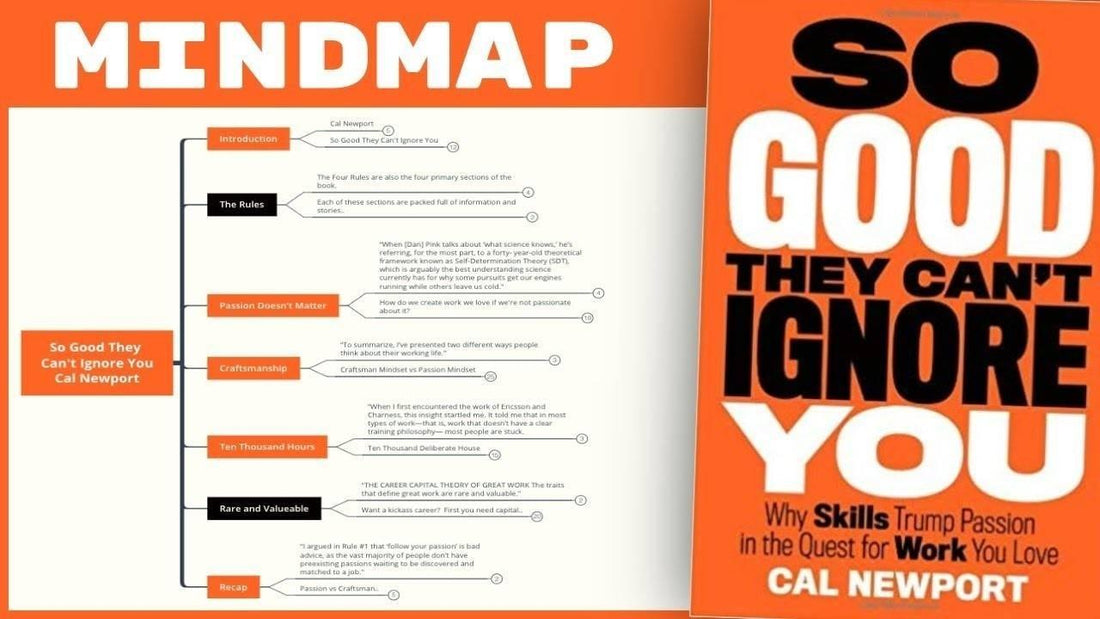Video Book Summary
Download all of the Mind Maps here.
Book Summary Notes
So Good They Can't Ignore You
“This argument flips conventional wisdom. It relegates passion to the sidelines, claiming that this feeling is an epiphenomenon of a working life well lived. Don’t follow your passion; rather let it follow you in your quest to become, in the words of my favorite Steve Martin quote, ‘so good that they can’t ignore you.’"
"It’s my hope that the insights that follow will free you from simplistic catchphrases like ‘follow your passion’ and ‘do what you love’—the type of catchphrases that have helped spawn the career confusion that afflicts so many today—and instead, provide you with a realistic path toward a meaningful and engaging working life.”
Why Skills Trump Passion in the Quest for Work You Love
- That's the subtitle of the book..
- Something that most people don't want to think about!
- Cal puts forward in this book that passion is not something you should take into account when trying to find a career..
We'll go more in depth into this during the Mind Map..
- Essentially he is saying that passion isn't what really drives us..
- Instead we're really looking for a few specific things that make our lives more fulfilling!
The Rules
The Four Rules are also the four primary sections of the book.
“RULE #1: Don’t Follow Your Passion"
"RULE #2: Be So Good They Can’t Ignore You"
"RULE #3: Turn Down a Promotion"
"RULE #4: Think Small, Act Big"
Each of these sections are packed full of information and stories..
They are all equally important as a whole but one might apply to you more than the others right now..
Inside the Mind Map I've simply tried to distill some of the practical advice given in each chapter
Passion Doesn't Matter
“When [Dan] Pink talks about ‘what science knows,’ he’s referring, for the most part, to a forty- year-old theoretical framework known as Self-Determination Theory (SDT), which is arguably the best understanding science currently has for why some pursuits get our engines running while others leave us cold."
"SDT tells us that motivation, in the workplace or elsewhere, requires that you fulfill three basic psychological needs—factors described as the ‘nutriments’ required to feel intrinsically motivated for your work:"
"Autonomy: the feeling that you have control over your day, and that your actions are important"
"Competence: the feeling that you are good at what you do"
"Relatedness: the feeling of connection to other people”
How do we create work we love if we're not passionate about it?
Follow the Self Determination Theory
- Do you feel you have control over your days and that your actions matter?
- Do you feel like you're good at what you do?
- Do you feel connected to other people in your work?
The answers to these questions matter much more than passion does..
- Science doesn't tell us we need a pre-existing passion in order to be successful..
- Why do so many people say you need to be passionate about something?
My thoughts are because.. They are passionate about what they do!
We're not getting advice from people just starting out..
People who don't control their day..
People who don't feel competent..
People who don't feel connected!
This is actually great news for a lot of us..
Because it means that all of us can become passionate about our work.. or at least happy about it!
We can become so good they can't ignore us..
Giving us control over our days
Feel competent about our skills
Connect with people
Craftsmanship
“To summarize, I’ve presented two different ways people think about their working life."
"The first is the craftsman mindset, which focuses on what you can offer the world. The second is the passion mindset, which instead focuses on what the world can offer you."
"The craftsman mindset offers clarity, while the passion mindset offers a swamp of ambiguous and unanswerable questions. There’s something liberating about the craftsman mindset: It asks you to leave behind self-centered concerns about whether your job is ‘just right,’ and instead put your head down and plug away at getting really damn good."
"No one owes you a great career, it argues; you need to earn it—and the process won’t be easy.”
Craftsman Mindset vs Passion Mindset
“Whereas the craftsman mindset focuses on what you can offer the world, the passion mindset focuses on what the world can offer you. This mindset is how most people approach their working lives.”
This is a gamechanger for me when it comes to getting into a flow state..
- Previously while working on things I would 'work on them to get them done' or I would worry about 'what to do next' and that robbed me..
- It created an environment where I wasn't feeling a connection to my work or like I was helping people!
So even though I controlled my own schedule I wasn't getting those two critical ingredients!
- Now I focus not only on what I'm doing but on HOW I'm doing it..
- Constantly trying to uplevel my skills and connect to the people I'm trying to help through my work!
Creating craftsmen through coaching..
One of my coaching clients works as an assistant to a CEO in a small business (25 People)
She came to me asking me to help her find something she was passionate about in order to create a business or find a new career..
This is very common with my coaching clients and I am extremely happy to help with that!
One problem.. This client didn't have a passion!
But she was suffering right now.. So what could we do?
Instead of focusing on finding her a passion I decided to focus on how we could use SDT to turn her into a craftsman and help her enjoy her day to day..
First we needed to find a way she could control her own schedule..
This was pretty easy.. We asked her boss for flex time!
She's very good at her job and got a 2 hour flex time so she could sleep in or come in early if she wanted..
Not 100% control but none the less much better
Next we needed her to feel like she was upleveling her skills..
She often found herself not doing much throughout the day..
So we decided to use that time to learn! Specifically learn skills to be really really good at her job..
All sorts of books, podcasts and YouTube videos are dedicated to her job so this was easy!
Finally we needed to connect her deeply to who she is really helping!
Next I helped her see that she wasn't just helping her boss..
Instead she was really contributing deeply to the vision of the entire company.. Which was something she connected with!
Ten Thousand Hours
“When I first encountered the work of Ericsson and Charness, this insight startled me. It told me that in most types of work—that is, work that doesn’t have a clear training philosophy— most people are stuck.
"This generates an exciting implication. Let’s assume you’re a knowledge worker, which is a field without a clear training philosophy. If you can figure out how to integrate deliberate practice into your own life, you have the possibility of blowing past your peers in your value, as you’ll likely be alone in your dedication to systematically getting better/"
"That is deliberate practice might provide the key to quickly becoming so good they can’t ignore you."
"To successfully adopt the craftsman mindset, therefore, we have to approach our jobs... with a dedication to deliberate practice.”
Ten Thousand Deliberate Hours
Cal talks about the 10,000 hour rule popularized by Malcolm Gladwell
- This is the idea that excellence at any task takes a certain amount of practice in order to be great..
- Specifically it takes 10,000 hours..
Most people get this wrong though..
- It's not 10,000 hours of 'being there' or of 'doing' the thing..
- It's about deliberately practicing the skill for that many hours..
- Something which.. If not built into the process almost never will be done!
Most knowledge workers don't have a 'path' to becoming great!
- That leads most of them to stay at the same level because they don't understand deliberate practice.
- But not us.. Now we know how important it is to practice deliberately in order to be successful..
How do we build deliberate practice?
- I recommend you check out a few of these Mind Maps I've done already..
- Deep Work - Cal Newport
- How We Learn - Benedict Carrey
- The One Thing - Gary Keller
Rare and Valuable
“THE CAREER CAPITAL THEORY OF GREAT WORK The traits that define great work are rare and valuable."
"Supply and demand says that if you want these traits you need rare and valuable skills to offer in return. Think of these rare and valuable skills you can offer as your career capital."
"The craftsman mindset, with its relentless focus on becoming ‘so good they can’t ignore you,’ is a strategy well suited for acquiring career capital. This is why it trumps the passion mindset if you goal is to create work you love.”
Want a kickass career? First you need capital..
Capital is defined as having rare and value-able skills!
- What is rare and valuable?
- Rare means that someone else can't easily get the skills that you've accumulated.
- Valuable means that someone is willing to pay top dollar for these skills
How do we accumulate rare and valuable skills?
- First we need to make sure that whatever endeavor we're going into is going to be valuable enough..
- Next we need to adopt the craftsman mindset and work for the full 10,000 hours.. Building up our skills!
Let's take personal trainers as an example..
How valuable is this skill?
Very valuable.. Some personal trainers are able to make millions a year!
People need/want this service so there is definitely money here.. (Contrary to popular belief)
How rare is this skill?
New personal trainers are a dime a dozen.. Weekend certifications and college certificates are easy to attain!
So how can you set yourself apart?
- 10,000 hours of focused work..
- New skills and certifications
- Specializing in something specific
- Learning more valuable skills and stacking them
- Sales
- Marketing
Recap
“I argued in Rule #1 that ‘follow your passion’ is bad advice, as the vast majority of people don’t have preexisting passions waiting to be discovered and matched to a job."
"In Rule #2, I then countered that people with compelling careers instead start by getting good at something rare and valuable—building what I call ‘career capital’—and then cashing in this capital for the traits that make great work great."
"In this understanding, finding the right work pales in importance to working right.”
Passion vs Craftsman..
Cal puts forward in this book that working right is more important than right work..
This is a concept not talked about much!
- It's something I agree with but with a caveat..
- I think there are people in the world who should go after their passion, their cause or create something!
Those people should still adhere to these principles though.. They are what will make them successful.

